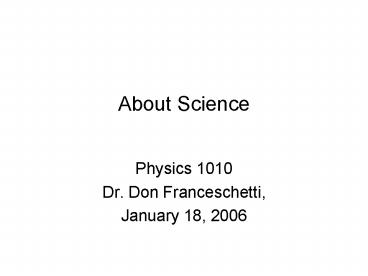About Science - PowerPoint PPT Presentation
1 / 22
Title: About Science
1
About Science
- Physics 1010
- Dr. Don Franceschetti,
- January 18, 2006
2
Science
- The body of knowledge that describes the order in
nature and the causes of that order. - The process of gathering knowledge about the
world and organizing it into testable laws and
theories. - Much that is good in the world is not science.
- The term science is sometimes used to describe an
organized body of thought in general
(mathematics, theology, literary criticism). Not
in this class!
3
Measurement
- The hallmark of good science. Important
scientific measurements go back to Greece, third
century BC. (those that we know about) - Erastothenes measured size of the Earth about 235
B. C. based on lengths of shadows - Aristarchus estimated diameter of moon as 2/5
that of earth from eclipse from width of Earth
shadow on moon. (actually closer to 2/7)
Distance to moon could then be found. (Coin
blocking moon)
4
Sun
- Aristarchus also measured distance to Sun using
right triangle. (ASA) - Size of Sun from pinhole image.
- And so on.
5
Scientific method (Galileo, Bacon)
- Observe
- Hypothesis
- Predict consequences
- Test by experiment or observation
- Generalize
- This is a gross oversimplification!
6
Scientific Attitude
- Observation (preferably experiment) is the
ultimate test. - A scientific statement must be falsifiable
(Popper). - Human authority means little.
- Examples of unscientific statements
- The alignment of the planets determines the best
time for making decisions. - Intelligent life must elsewhere else in the
universe. - There will never be a safe storage mechanism for
nuclear waste.
7
Science, Art and Religion
- Science seeks to discover order in the natural
world. Like watching a game being played and
trying to figure out what the rules are. - Religion is concerned with purpose.
- Art is concerned with individual expression and
creativity. - There are some interactions (e. g. painting,
musical instruments, origins)
8
Pseudoscience
- Belief systems which mimic science but are not
falsifiable. Generally appeal to authority and
resist criticism. - Astrology
- Shamanism (pendulums, pyramids, crystals, etc.)
- Energy multiplying machines
- Alternative medicines?
- Psychoanalytic schools?
9
Physics is the Basic Science
- It explains
- Chemistry
- Astronomy
- Biology
- Geology
10
Physics will be presented
- As the child of philosophy and craft.
- In historical context.
- In relation to technology, wars, governments and
how people live - As a part of your inheritance.
- As a liberal art
- As the result of human effort
- Some pretty weird humans involved
11
Technology
- Is not science but the application of science to
human wants and needs. - The applications can be good or bad or hard to
tell. - Science per se is generally considered good,
though there are ethical issues.
12
Important Dead Greek Guys
- Thales of Miletus
- c 624-c 547 B. C.
- All things are full of gods
13
Important Philosophical Dead Greek Guys
- Heraclitus
- All is change
- Parmenides
- Change is impossible
- Zenos Paradox Achilles never catches up with
the turtle.
14
Pythagoras 569-475 B.C.
- Related musical harmony to numbers.
- Music of the spheres.
15
Astrology/Astronomy
- Worlds second oldest profession
- Celestial Sphere, planets (wanderers) hard to
explain using circular motion - Ptolemy (90-168 A.D.) Almagest allowed
calculation of planetary positions for horoscopes
16
Another Important Greek Guy
- Democritus
- c. 460 c. 370 B. C.
- Atoms unchanging, aggregates change.
17
Empedocles (fl c. 450 B. C. )
Influence on Hippocrates, too. Four humors
theory is related.
18
Plato (c. 428-c. 348 B.C.)
- World was a pale reflection of ideal world
- Atoms were geometric shapes
- Triangles are elementary particles
- He thought circles were the perfect figures
19
Aristotle (384-322 B. C.)
- Kept 4 elements, added quintessence
- No atoms
- Terrestrial motions were natural or forced
- Heavier objects fall faster
- Celestial motions were circular
- Heavens were perfect with no change
20
Copernicus (1453-1543)
- De Revolutionibus Orbum Coelestum 1543 (note
date) - Heliocentric universe, but still orbits are
circles
21
Galileo Galilei (1564-1642)
- Uses telescope to prove heavens are imperfect
- Principle of inertia, end of distinction between
natural and violent motion - All bodies fall with same acceleration when air
resistance is negligible.
22
Sir Isaac Newton (1642-1727)
- Three laws of motion makes it possible to
identify and quantify forces. - Inertia
- Force determines change in velocities
- Action reaction law
- Law of Universal Gravitation
- Nothing special about the Earth































